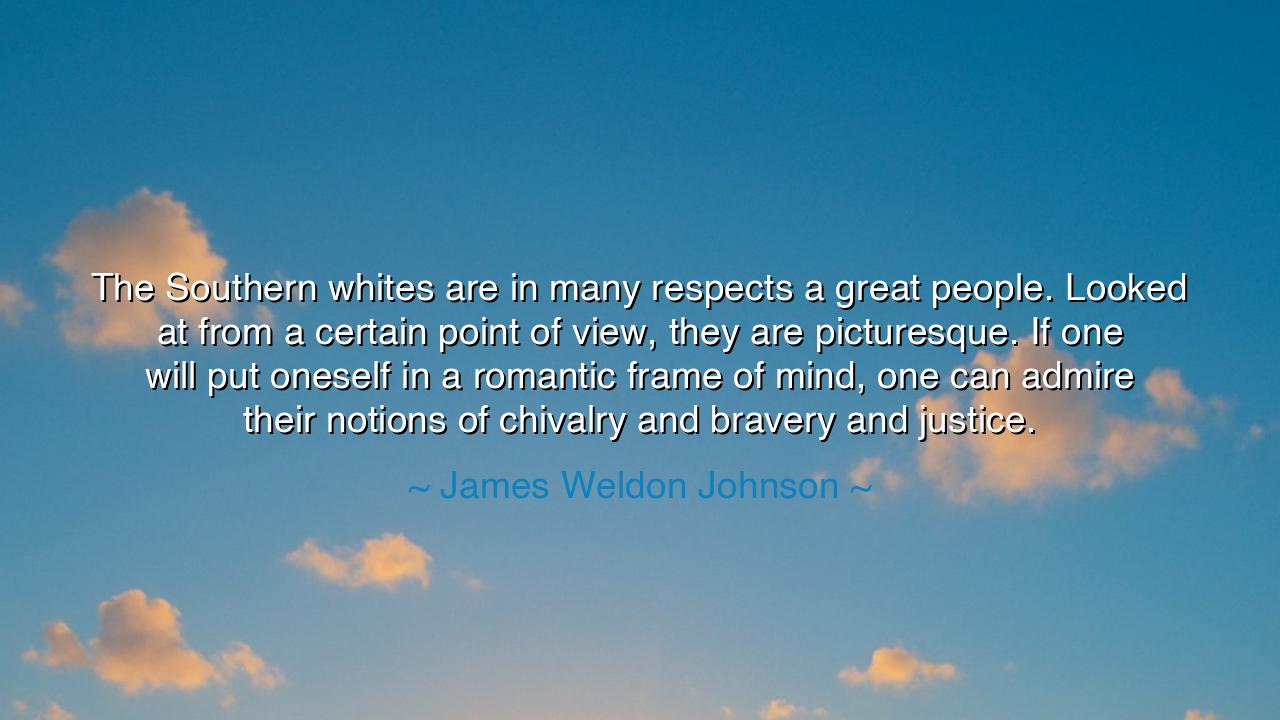
The Southern whites are in many respects a great people. Looked
The Southern whites are in many respects a great people. Looked at from a certain point of view, they are picturesque. If one will put oneself in a romantic frame of mind, one can admire their notions of chivalry and bravery and justice.






Hear the words of James Weldon Johnson, poet, diplomat, and voice of a people: “The Southern whites are in many respects a great people. Looked at from a certain point of view, they are picturesque. If one will put oneself in a romantic frame of mind, one can admire their notions of chivalry and bravery and justice.” These words, clothed in measured praise, conceal a deeper truth, for Johnson knew the weight of history, the cruelty of slavery, the bitter injustice faced by his people. And yet he spoke with balance, recognizing that even those who oppressed could, in the light of myth, appear noble.
The origin of these words lies in the Harlem Renaissance, a time when Black voices sought not only to condemn oppression but to analyze, to reflect, to reclaim narrative. Johnson, born in 1871, had lived through the end of Reconstruction and the rise of Jim Crow. He had seen firsthand how the South clung to its identity, wrapping its pride in tales of honor and chivalry. Plantations were romanticized, Confederate soldiers lionized, and white Southern culture presented itself as gallant and picturesque. To an outsider willing to look through this “romantic frame,” these qualities might inspire admiration. Yet Johnson knew that beneath the veneer lay hypocrisy: the same people who praised justice denied justice to millions.
This is the paradox he captures. On the surface, the Southern whites could be admired as guardians of tradition, their valor in war, their codes of honor, their hospitality. Stories of duels fought for dignity, of knights defending women, of orators rising in courts of law—all these seemed rich with grandeur. Yet such chivalry existed side by side with slavery, lynching, and the brutal denial of human rights. The romantic gaze could make it beautiful, but the honest gaze revealed its rot. Johnson challenges us to see both: to acknowledge the poetry of the South, but also its tragedy.
Consider the figure of Robert E. Lee, celebrated in the South as the very model of honor and military genius. To many, he embodied chivalry—dignified, restrained, loyal to his people. Statues rose in his name, songs honored his cause. Yet his cause was the defense of a system that enslaved millions. From one view, he was noble; from another, complicit in horror. This duality is what Johnson calls us to see: that myth and reality often live side by side, and one must not confuse one for the other.
The meaning of Johnson’s words is not flattery of the oppressor, but warning to the reader. He reminds us that human beings are complex, that even those who commit injustice may clothe themselves in ideals of bravery and justice. The danger lies in becoming lost in the romance, forgetting the cost borne by the oppressed. To admire the Southern whites without remembering the slaves is to fall into illusion. Yet to deny their cultural strength, their fierce identity, their artistry of self-myth, is also to miss a truth. Johnson’s wisdom rests in holding both realities at once.
The lesson is clear: when confronted with any culture or people, do not let romanticism blind you. Admire their strength, their artistry, their courage—but always ask: at whose expense? Do not confuse the image with the essence, nor allow myth to erase suffering. For the world is full of stories that seem noble, yet conceal injustice. To be wise is to see both the beauty and the shadow.
Therefore, children of tomorrow, let Johnson’s words guide you. Do not fall prey to easy tales of honor or justice without questioning them. Look beneath the “picturesque” and ask who has been silenced, who has paid the price. But neither deny the complexity of your fellow humans—remember that even oppressors are shaped by culture, by pride, by dreams of greatness. Only by holding these contradictions together can you see the whole truth.
Thus, Johnson’s observation becomes timeless counsel: the South may be romantic, but romance can deceive. Seek truth beyond beauty, justice beyond chivalry, and humanity beyond myth.






AAdministratorAdministrator
Welcome, honored guests. Please leave a comment, we will respond soon